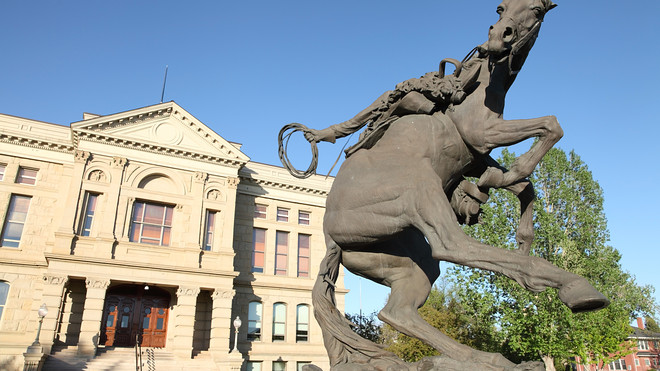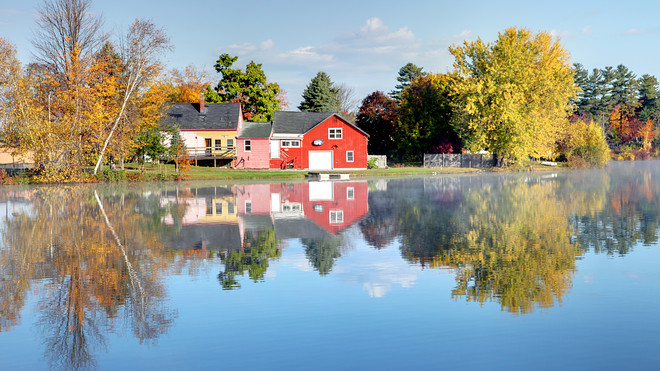Hi Catey,
I’m seeking to retire to a libertarian-minded city with no (or very, very low) income tax, low property tax, low sales tax, low home- and car-insurance rates, no vehicle inspection and emissions tests, constitutional carry, and where I can “live and let live.” Any places you can suggest?
Thanks!
U.
Hi, U,
To answer your question, I went right to the source: the Libertarian Party itself, where I had a lively chat with Dan Fishman, the party’s executive director, who had a lot of advice for you. He said that, while the Libertarian Party doesn’t maintain a list of the most libertarian cities and towns in America, there are certain states known to be more libertarian-friendly in many ways: New Hampshire — with its motto “Live Free or Die” — being the most obvious one, but also some spots in the mountainous western U.S., as well as parts of Texas.
That said, U, you probably won’t get all of the items on your libertarian checklist. But you can get many. To make my list of suggestions, I first looked at the states that seemed the most libertarian-friendly, based on Fishman’s advice and an assessment of the tax and gun laws. Then I looked at where in those states retirees might love. Here are some suggestions.
Cheyenne, Wyo.

The state capitol in Wyoming.
iStock
The state of Wyoming is a solid spot for libertarians to consider retiring, thanks to its wide open spaces (you can “live and let live” here), lower tax climate for retirees (the state has no income tax and low sales and property tax) and its gun-friendly environment. It’s one of the 10 best states for gun owners, according to Guns & Ammo magazine, and there is “no statewide emissions inspection requirement,” according to AAA.
Fishman mentioned Cheyenne in particular as an interesting place to consider retiring (though he adds that it is chilly), as it offers that Wyoming spirit but also has retiree-friendly amenities like a regional hospital and airport. Many parts of Wyoming are so remote that a retiree with health issues or one who wants to travel might struggle. “What makes Cheyenne most appealing to residents … is the real spirit of the West: low-rise buildings, wide-open spaces, tumbleweeds,” writes AARP, which put Cheyenne on its most affordable places to retire list.
And Kiplinger’s put this town on its 2019 best places to retire list, noting that the state will appeal to “loner types,” and Cheyenne itself offers a ton of perks: “Train aficionados can enjoy the area’s railroad history and displays of locomotives, including the world’s largest steam engine. … Another big local attraction: Every summer since 1897, Cheyenne hosts the world’s largest outdoor rodeo and Western celebration, Frontier Days, now a 10-day event. You also have plenty of outdoor diversions, such as miles of trails for hiking, biking and horseback riding; fishing and boating; and birding and other wildlife viewing.” Added bonus: The cost of living here is lower than average, according to Sperling’s Best Places.
Keene and Laconia, N.H.

A waterfront property in the Monadnock region of New Hampshire near Keene.
iStock
The state of New Hampshire is probably the best known of the libertarian-minded states (that’s why I picked two spots here): Not only because of its state motto, either; it’s the home of the Free State Project, which bills itself as “a movement of thousands of freedom-loving people to New Hampshire, where we are working to reduce the size and scope of government in order to achieve Liberty in Our Lifetime.” In other words, you can be around like-minded folks in this state, which is why we chose to include it. The tax situation, though, is mixed: New Hampshire has no income tax on salaries and wages and no sales tax, though it does tax dividends and interest, and property taxes can be high. It scores decently on gun friendliness, according to Guns & Ammo magazine, and highly on health care, which is obviously good news for retirees. (You can find the vehicle-emissions rules here.)
So where do you pick among the choices in New Hampshire? Many cities are worth consideration here, with Fishman highlighting Keene as a spot to consider. He highlights the following controversy to illustrate the libertarian-mindedness of Keene: In 2018, a pho restaurant that was in the same building as City Hall wanted to call itself Pho Keene Great (say it out loud — and bear in mind that pho is pronounced fuh — if you must); the city at first wasn’t having it, but residents voted to allow it — and not to worry, libertarians, it was approved last year. Keene — a college town — offers “a charming downtown Main Street teeming with shops, restaurants, a retro movie theater, and the quintessential New England white clapboard church,” observes New England Today Travel. It also boasts a cost of living that’s lower than average, and a median-priced home can be had for less than $ 200,000.
Laconia is also worth a look: It landed on Kiplinger’s list of the best places to retire in the Northeast, and, for someone who wants to be near the water, it works. “Tucked between Lake Winnipesaukee and Winnisquam Lake, Laconia has been dubbed ‘The City on the Lake’ [and the] ‘home city to New Hampshire’s Lakes Region.’ That means plenty of beaches and water-related activities for you in the warmer months. Other outdoor recreation abounds nearby, too. Gunstock Mountain Resort in neighboring Gilford, for example, offers camping, ziplining and snow sports, as well as fairs, events and dining options,” Kiplinger says of Laconia. Added perks: Laconia has a cost of living that’s below average and you can score the median home for about $ 200,000 — though winters are cold, and crime is slightly elevated. (Kiplinger’s highlights statistically safer neighborhoods here.)
Mesa, Ariz.

Sunrise over the mountainous desert landscape.
iStock
Arizona is one of the most tax-friendly states for retirees, according to Kiplinger’s, in addition to being gun friendly (it ranks No. 1 on Guns & Ammo’s list). Though Fishman points out that Arizona residents generally aren’t keen on open borders, as many libertarians are. And unlike New Hampshire and Wyoming in most months, Arizona offers warm weather, which is a big reason it’s popular with retirees. (You can find the vehicle-emissions rules here.)
I asked Annette Fuller, the editor of Where to Retire magazine, where a libertarian might like to retire in Arizona, and she noted that Maricopa County — home to Mesa — has an active libertarian club. And Mesa itself, just outside Phoenix, has landed on many a best-places-to-retire list, including her list of best biking towns.
Kiplinger’s, which recently put it on the “best places to retire for your health” list, notes that “Arizona is known for its sunshine and golf courses, and Mesa has plenty of both. But the city has much more to attract retirees, such as its proximity to top-rated hospitals, a cost of living that’s lower than the national average and a range of activities for lovers of nature, sports and the arts.”
Indeed, when you’re craving wide open spaces, you’re close to the Tonto National Forest (the fifth-largest forest in the U.S.) and the Superstition Mountains; when you want a great meal, Mesa is known for farm-to-table cuisine and even has a Fresh Foodie Trail, so you can sample the goods. The downsides: Summers are hot, and some complain about growth and sprawl.
